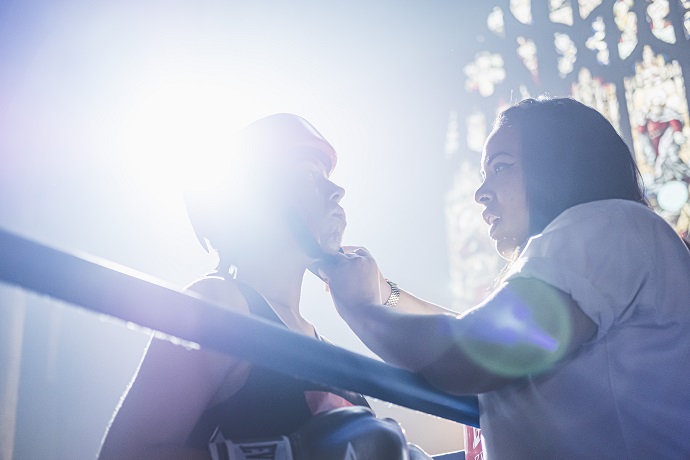
Newly Updated
Image: Caesar Aldhela
If you want to move into fulfilling work, there’s one thing you’ll need to have in place before anything else. It’s not the right idea, a detailed plan or sufficient money (though they all help). It’s more fundamental than that. Here, with examples from her own story, Natasha shares what’s at the core of a successful shift.
At 7.45 that chilly morning in April 2012, the bus was almost empty.
I heaved my rucksack onto the luggage rack and chose a seat near the front.
The bus door was still open.
The air was crispy. I unzipped my jacket and sat on my fingers to warm them.
The door was still open.
I looked out of the window; my best friend was waving from the pavement. He was wearing the green woollen jumper I'd got him for Christmas the year before. That had been a great Christmas.
The door was still open.
It would have made so much sense to get off. It would have taken nothing – four steps? five? – to return.
But I didn't.
I stayed put. I listened to the hydraulic wheeze of the suspension, and I felt the shake of the engine as it rumbled to life.
And I watched the bus door shut.
We jerked forward once, stopped, and then gradually began to roll. I waved, once, and then faced forward again.
I watched the city I knew rush past, saying silent goodbyes to every familiar street, every building soaked with memories. The signs for the airport became more frequent.
I waited for the panic to set in.
It didn't.
I waited for my belly to tie itself in a knot.
It didn't.
I wasn't sure why not.
To all intents and purposes, I should have been a wreck.
I was newly unemployed, newly single. My house was on the market to be rented to cover the mortgage while I was away. I had told my family they wouldn't hear from me for a while. I was leaving everything I knew.
I didn't know how long I was going to be gone for. I didn't know what I would discover while I was gone. I didn't really know what in the world I was doing.
But I knew that at last, I was doing something, and I knew it was going to work out.
Because it had to. I'd committed to it.
And for your career change to happen, you're going to have to commit to it, too.
I'll share more about that bus ride, and what happened in the weeks and months afterwards, shortly.
But honestly, my story isn't really the point.
The fact that I didn't get off that bus before the door closed isn't the most important thing for you and your story.
The most important part of this for you is why I didn't get off the bus – what it was that kept me in that seat all the way to the airport, and what kept me going through the uncertainty that followed.
Because if you're going to make a shift into work you love, you're going to encounter a whole world of obstacles; real and imagined; physical and emotional and financial and any other flavour you can think of.
You're going to have stacks of opportunities to get off the bus – to give up – and 14,000 good reasons to do so.
So, before you learn how to generate ideas for your future career, how to network, what to do with your LinkedIn profile, how to ace an interview for a job you're not qualified for… before we do any of that stuff, we need to start from the foundations.
The one thing that separates successful career changers from those that end up stuck.
Commitment.
If you want to find and move into work you love, and you have no idea where to start, you start with a commitment.
Binding yourself wholeheartedly to an outcome you've chosen.
Unfortunately, 'commitment' is a word that's heavily misused and deeply misunderstood – and you can't commit to something without knowing exactly what it means to do so.
Side note: commitment does not mean temporarily abandoning your life and booking a one-way ticket to Greece (although that's how this bit of it looked for me).
It's not about dropping a full-time, respectable, salaried position and waiting tables six nights a week instead (although that's how part of it turned out for me).
It's not about feeling misunderstood and full of self-doubt, nervous that your family will never respect you again (although that's how part of it felt for me).
Your career change will likely look very different from mine. It might involve kids; it might involve entrepreneurship or retraining; it might happen in a major city or your garden shed; it might take two weeks, or five years.
The specifics aren't the point.
This is about choosing something and making it happen, no matter what the odds.
It's about the one thing that underpins every career change – everything, in fact, in your life.
So let's take a look at the nature of commitment – and what it looks like in practice.
You're either committed, or you're not

“The difference between involvement and commitment is like ham and eggs. The chicken is involved; the pig is committed.” – Martina Navratilova
For a good year before I chose my seat on that bus, I was hungry for a change. I was waking up miserable, dragging myself to work, constantly daydreaming of doing something different.
I used to sit at my desk in the office, surreptitiously scrolling through travel blogs and job sites and reading articles about career change. I'd lie in bed at night, my mind spinning madly, wishing wildly, hoping something would somehow change.
You wouldn't have been wrong to have said that I really wanted to move into a career I loved. I did. But I wasn't committed to it yet.
You could tell I wasn't, because I was doing what I would now (with the benefit and rosy glow of hindsight) affectionately call 'Farting Around'.
Dabbling. Getting 'informed'. Daydreaming. Talking a lot, feeling a lot, doing very little.
Sometimes we hear people talk about commitment like it's a sliding scale:
“I'm definitely more committed now than I was last month.”
“I just don't think she's committed enough.”
But commitment doesn't work like that.
It doesn't fade and wane – there are no 'degrees' of commitment.
You're never 'two-thirds married'.
Either you're in, or you're out.
You are always committed to something

“What is the story you tell, and what is the story you wish to tell?” – Jeanie Manchester
For that initial year, I wasn't committed to making a career change, because I was still committed to something else.
I was worried about staying miserable at work forever, but I was more worried about what my family – particularly my father – would think of me if I followed my gut; afraid of losing their respect if I took an 'alternative' route through life; terrified of screwing up and having to come back with my tail between my legs.
I wasn't yet committed to creating a life and a career I loved, because I was too committed to looking good, being liked, and having my family's approval.
There's nothing wrong with that, incidentally – if you're feeling a pang of familiarity, there's no shame in being committed to status and admiration and security.
But know this: you are always committed to something.
And if that something is at odds to making a career change, you're going to need to let go of that commitment first.
(Top tip: you can tell what someone is committed to by looking at what they consistently do.
If you're taking action, exploring new areas, saving money, talking to people, getting support, doing something, however small, every day, towards making a shift, you're probably committed to making a career change.
If you're watching TV every night and complaining, you're probably committed to feeling bad and being right.)
It might be being busy, drinking Starbucks, knowing what you're doing, looking good to your friends and family, having a high-status social standing...
Whatever it is for you, if nothing's moving in your career change right now, it's because you're deeply committed to something else.
Commitment is commitment (it's not desire, not willingness, not interest, not a promise...)

“There's a difference between interest and commitment. When you're interested in doing something, you do it only when it's convenient. When you're committed to something, you accept no excuses - only results.” – Ken Blanchard
That bus I stepped onto in April 2012 took me to the airport. I got on a plane to Greece, and rode yet more buses up into the mountains of Zagorohoria.
I spent four months working with a herd of horses in the bright mountain light, under huge skies.
It was glorious, and liberating, and exactly what I needed – and I spent every second I was there learning more about myself and where I wanted to get to.
When my return flight touched down in the UK in late July, I stepped onto another bus. I chose my seat again, with no idea what I was returning to, still with no firm ideas on what I wanted to do with my career.
I had very few savings, and fear and discomfort were raising their ugly heads once again.
My email inbox was a steady stream of messages from recruitment agents, offering me interviews at organisations just like the one I'd recently left. Tiny tugs, beckoning me back to security and familiarity. One by one, I unsubscribed from them all.
In late August, I took a train to London and interviewed for a role at a management consultancy. The salary would have been extraordinary. As soon as I accepted the offer, I would have been flying all over the world, working with some of the biggest household names, establishing a powerful network and a highly respectable career.
But my gut said no. And so did I.
This job, while bursting with status and benefits, while it would have been a 'sensible' move, was not in line with my commitment.
It wasn't work that lit me on fire.
And if I took it, I wouldn't have either the time or the headspace to continue going after something I loved. Saying 'yes' would have been an excuse to back down, to give up.
I returned home and got a job waiting tables instead. I earned a pittance, but I had my entire days free to focus on my shift. I spent every minute of those free hours dedicated to finding work I loved.
Working a student job, getting paid virtually nothing, was uncomfortable. It was a little embarrassing. But it had integrity. It was in line with my commitment.
I wasn't just interested in finding work I loved.
It was the only option I was willing to accept.
It's 'commitment', not 'comfort'

“The relationship between commitment and doubt is by no means an antagonistic one. Commitment is healthiest when it is not without doubt but in spite of doubt.” – Rollo May
If you'd come to look for me at some point during that period of my life, you would have had a good chance of finding me sitting on the floor of my kitchen, staring into space, completely freaking out.
I would have been wide-eyed, my hands slowly fidgeting, my belly in a knot, a lump in my throat. I might have been red-eyed from an exhausted overflow of tears. My nails would have been bitten. I'd have looked a bit nuts.
Was I doing the right thing? What if I ran out of money? Is this just a crazy pipe dream? Was I wasting precious time, while all my peers climbed their respective career ladders? Would anyone ever take me seriously?
I was way outside my comfort zone.
Nervous, doubting, sometimes angry, often questioning everything I was doing, but still, beneath it all, committed.
I needed to give myself space to have my panics, and my concerns, and my frustrations, but I was still going to find a career I loved.
Being committed is the only thing that makes things move, but they don't always move easily. This process is going to scratch, and groan, and chew on you at times, and that's OK.
You need to be willing to go to the difficult places, push yourself past your comfort zone, take extraordinary actions to create extraordinary results. You need to be OK with being uncomfortable.
You can feel excited and inspired, or you can feel like crap, and still be committed.
In fact, it's in the moments where it hurts that your commitment begins to shine.
Extraordinary achievements come from committing to the 'what' before you know the 'how'

“Until one is committed, there is hesitancy, the chance to draw back, always ineffectiveness.
“Concerning all acts of initiative and creation, there is one elementary truth the ignorance of which kills countless ideas and splendid plans: that the moment one definitely commits oneself, then Providence moves too.
“All sorts of things occur to help one that would never otherwise have occurred. A whole stream of events issues from the decision, raising in one's favour all manner of unforeseen incidents, meetings and material assistance which no man could have dreamed would have come his way.” – attributed to Goethe
“I'm going to travel the world and make a living doing something I love” was not a reasonable sentence for me when I committed to it.
I had no idea how I was going to do it, or what it would look like when I got there.
But I didn't need to know that yet.
All I needed to begin with was my commitment.
What Goethe calls 'Providence' in his famous quotation – for me, was the result of a buildup of tiny nudges I was setting in motion every day.
I had no idea how I was going to find this work I loved, but committing to it anyway coloured and guided every move I made.
It affected the nature of the conversations I had. It changed the things I read, the places I visited, the things I noticed and paid attention to, the kinds of actions I took.
And as my way of moving through the world shifted, so did the way the world responded to me.
I talked to the people around me about the journey I was on with gravitas and honesty (instead of hopelessness and complaints); they heard in my voice that I was serious, and responded in kind with connections and resources and ideas.
I was offered the opportunity to help launch a business about well-being at work (that I felt hopelessly underqualified for), because I'd mentioned to a friend that it was something I was looking into as part of my career change.
I was given my first copywriting job by a man I'd met the day before in a coffee shop.
I reached out to the owners of blogs and organisations I loved, to ask them about their work (blogs and organisations I'd discovered reading in Greece late at night, after the horses were put to bed).
One of those organisations was Careershifters.
When I reached out to Richard at Careershifters, I didn't know it was going to lead anywhere.
I didn't know how to turn a cold email to an inspiring stranger into an offer to work with this organisation (I've now spent years teaching exactly how to do this on our Career Change Launch Pad).
I didn't have the 'how'.
I just had my commitment.
But in the light of my commitment, the steps began to reveal themselves.
Commitment will change you

“The irony of commitment is that it's deeply liberating – in work, in play, in love. The act frees you from the tyranny of your internal critic, from the fear that likes to dress itself up and parade around as rational hesitation. To commit is to remove your head as the barrier to your life.” – Anne Morriss
There's something unmistakable about being in the presence of someone who's committed.
While everyone is different, and everyone's situation is unique, there are a few common qualities you'll find in anyone with true commitment.
And once you're committed, you'll notice them in yourself, too.
1. You'll start behaving weirdly
Or if not weirdly, then at least unusually.
Commitment, by its very nature, takes you outside of your usual modus operandi.
You’ll start doing things you don't normally do, changing your regular routines to support your commitment. You'll push past the boundaries of your comfort zone, trying out new approaches. If something you've been doing hasn't been working, you'll ditch it.
Get ready for life to look different.
2. Your complaints change
If you've been unhappy at work for a while, you'll probably have spent a fair amount of time airing your misery either to yourself or to the people around you.
Some of that airtime may have been constructive airtime – getting your frustrations spoken so you could get on with tackling them.
Some of it (occasionally all of it) may have been whining.
There's not a lot of space for that kind of complaint inside a commitment.
There might be discomfort; there might be things you need to talk about; but airtime without action won't fly anymore.
You'll notice your complaints being less “Oh cruel world, why me?”, and more “How do I figure this out?”
3. Everyone will know what you’re doing
Your commitment becomes what you're up to in the world.
When people ask you how you're doing, what you've been up to, you can't help but tell them about what's going on.
You'll ask for help tackling your challenges.
You'll look for connections between your commitment and pretty much ANY topic of conversation that arises.
People will begin to laugh about your single-mindedness. And you won't care – because they've noticed, and they'll think of you next time they come across something useful...
So… now what?

“Commitment is an act, not a word.” - Jean-Paul Sartre
There is no instruction booklet for commitment.
And with good reason: it's not a complicated process.
To commit, commit.
Either you're in, or you're out.
But if there were a few things that I could offer you to keep in mind, here's what I'd say:
1. Choose.
Don't tell yourself you're committed when deep down, you're really not willing to be.
If you “WANT to commit, but...” then you're not going to commit.
It's fine if you're committed to making a career change, and it's fine if you're not.
But get in or get out. Choose.
Know that change does not happen without commitment, and choose.
Don't fart around in the shallows.
It's a waste of your time. It doesn't work.
2. Commit to a meaningful outcome.
The phrase: “I’m committed!” might mean you're committed to making a shift into work you love by the end of the year.
It might also mean you're married, or officially signed into a mental health facility.
What are you committed to? What's the goal, the vision, the outcome you're going to create in the world, whether you know how yet or not?
(Note: a commitment sounds like a big, hairy, audacious decision. It rings like a bell. "I'm going to be making a living from work I love before the end of the year." "I'm going to have a successful photography business by June." "I'm going to transform the relationship between international development organisations and local leadership in the DRC." It shines. If it sounds like a To Do list, it's not a commitment. It's a To Do list.)
3. Start telling people about it.
Commitment doesn't work in secret.
The more you share what you're committed to with other people and with the world, the more it comes to life.
By all means take some time alone to get committed to what you're going to do, but then get on the phone to a friend, reach out to your family, tell someone about what you're up to.
Make it real, create it, in language. And then keep your word.
4. Build a team of supporters
As well as those you simply share your commitment with, there will also be people you can ask to support you.
Find them.
They might be family, friends, mentors, a coach – whoever makes most sense for you and your commitment.
Suggest different ways for them to support you, whether it be keeping you accountable with regular check-ins or sharing their knowledge and advice.
Keep them close – they will help you make it through your kitchen-floor moments.
5. Take your first action
Commitment is a lovely idea in theory, but it doesn't exist in theory.
If you're not taking action toward your career change commitment, then you're still committed to something else.
(And if you don't know what 'something to do', work it out. Let go of your commitment to know what you're doing all the time; it's holding you back.)
Make something up.
You have to.
You're committed to it.
I often wonder what might have happened that April morning, if I'd taken advantage of the still-open door and stepped off the bus.
Where would I be now? What would my career, and my life, look like?
That moment of limbo, gazing at the open door, was a moment of truth for me.
The choice to stay in my seat was a renewed commitment to a future I was willing to do just about anything to create. And it worked.
So if you're reading this, wanting to make a shift into work you love but unsure of where to start, this is my invitation to you: commit to it.
Get on the bus, and stay there.
Where do you see commitment showing up (or not showing up) in your career change? Let me know in the comments below!




